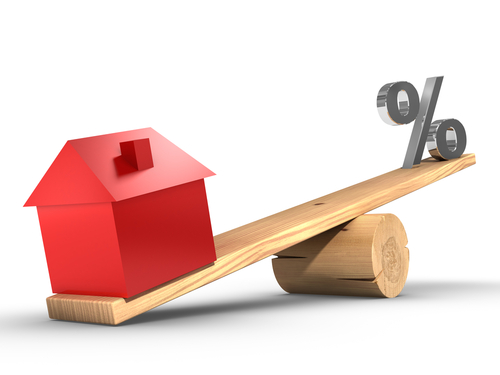Borrowers planning to buy a home or refinance their existing mortgage will undoubtedly be on the lookout for the best mortgage interest rate for which they qualify. Although rates have started to climb over the past few weeks, they remain near the historic low of 3.49% reached the week ending July 26, relatively speaking.
You should take the time to prepare for the mortgage application process before you apply for a home loan.
Here are a few action steps you can take that will improve your chances of obtaining the mortgage interest rates available, based on your personal financial situation.
Step1: Obtain a Copy of Your Credit Report
According to the Fair Credit Reporting Act, the three major credit bureaus, Experian, Equifax and Trans Union must provide consumers a free credit report upon request every 12 months. Order your free report several months before you intend to submit an application for a mortgage. When you receive the document, review it for inaccuracies and outdated data.
If you find problems with the report, put your request for correction in writing. The rules allow credit bureaus 30 days to look into any disputes.
Step 2: Build Your FICO Score
The credit score needed to qualify for a mortgage varies from bank to bank. Remember, lenders usually reserve advertised rates for borrowers with the top credit scores. To obtain the best mortgage rates for conventional loans, many lenders require a credit score of 740 or higher. Currently, the minimum score needed to qualify for a mortgage averages around 620.
Raise your credit score by paying your bills on time and lowering your debt-to-income ratio. You can do this by paying down the balances on retail store accounts and credit cards. Avoid making major purchases, such as a car or other high-priced items. Do not fill out credit applications prior to applying for the mortgage.
Step 3: Gather Information Documents
Call around to a few lenders and find out what information and documents they require for mortgage applications. Usually, lenders require W2s, two most recent paycheck stubs, last two years tax returns and two or three months of your bank statements. Self-employed borrowers will probably need to supply lenders additional financial information.
Delays in getting the necessary data in to complete your application can cost you in the form of a higher interest rate.
Step 4: Compare Rates, Fees and Points
Determine the type of mortgage you want such as 15-year or 30-year fixed-rate or adjustable-rate mortgage. The Federal Reserve board recommends you compare rates, fees and points from several banks. You also need to know the lender’s down payment requirements. If refinancing your mortgage, start with your current lender.
Step 5: Negotiate the Best Mortgage
After you gather information from each lender or mortgage broker, acquire a written list of costs for the mortgage product. After you receive the list, ask each lender if they would lower or waive one of more of the expenses on the list. You can also try to bargain down the interest rate and points. After you complete the negotiations, get a written lock-in agreement from the lender.
Borrowers planning to buy a home or refinance their existing mortgage will undoubtedly be on the lookout for the best mortgage interest rate for which they qualify. Although rates have started to climb over the past few weeks, they remain near the historic low of 3.49% reached the week ending July 26, relatively speaking.
You should take the time to prepare for the mortgage application process before you apply for a home loan.
Here are a few action steps you can take that will improve your chances of obtaining the mortgage interest rates available, based on your personal financial situation.
Step1: Obtain a Copy of Your Credit Report
According to the Fair Credit Reporting Act, the three major credit bureaus, Experian, Equifax and Trans Union must provide consumers a free credit report upon request every 12 months. Order your free report several months before you intend to submit an application for a mortgage. When you receive the document, review it for inaccuracies and outdated data.
If you find problems with the report, put your request for correction in writing. The rules allow credit bureaus 30 days to look into any disputes.
Step 2: Build Your FICO Score
The credit score needed to qualify for a mortgage varies from bank to bank. Remember, lenders usually reserve advertised rates for borrowers with the top credit scores. To obtain the best mortgage rates for conventional loans, many lenders require a credit score of 740 or higher. Currently, the minimum score needed to qualify for a mortgage averages around 620.
Raise your credit score by paying your bills on time and lowering your debt-to-income ratio. You can do this by paying down the balances on retail store accounts and credit cards. Avoid making major purchases, such as a car or other high-priced items. Do not fill out credit applications prior to applying for the mortgage.
Step 3: Gather Information Documents
Call around to a few lenders and find out what information and documents they require for mortgage applications. Usually, lenders require W2s, two most recent paycheck stubs, last two years tax returns and two or three months of your bank statements. Self-employed borrowers will probably need to supply lenders additional financial information.
Delays in getting the necessary data in to complete your application can cost you in the form of a higher interest rate.
Step 4: Compare Rates, Fees and Points
Determine the type of mortgage you want such as 15-year or 30-year fixed-rate or adjustable-rate mortgage. The Federal Reserve board recommends you compare rates, fees and points from several banks. You also need to know the lender’s down payment requirements. If refinancing your mortgage, start with your current lender.
Step 5: Negotiate the Best Mortgage
After you gather information from each lender or mortgage broker, acquire a written list of costs for the mortgage product. After you receive the list, ask each lender if they would lower or waive one of more of the expenses on the list. You can also try to bargain down the interest rate and points. After you complete the negotiations, get a written lock-in agreement from the lender.






